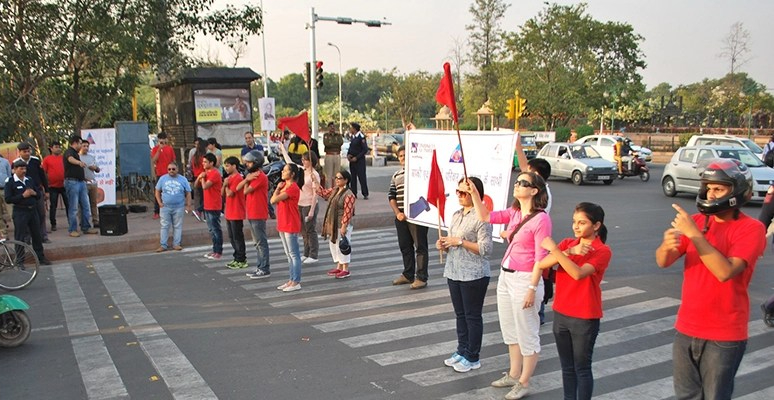By Dr Mridul Bhasin
In 1999, my 17-year-old daughter was killed by an out-of-control bus. The driver had previous infractions of drunk driving. There were several bystanders and passers-by, but no one stopped to help.
It is still difficult to think about this profoundly tragic experience.
Who or what should we blame in these instances? The driver who was directly responsible? Or the government, which failed to enforce traffic rules and keep dangerous drivers off the road? Or our societal road safety norms that promote risky behaviour and have no provisions for when “accidents” occur?


When we think of the sheer number of human lives lost in road traffic crashes in the South Asia region, we begin to realise that we need to build our own road safety infrastructure using shared policy initiatives and best practices.
The region is home to an estimated 1.7 billion people, representing around 25 percent of the world’s population. It also accounts for 25 percent of the world’s road-crash fatalities. This, although it is the world’s least urbanised region, with only 10 percent of the world’s vehicles.
South Asia is aspirational in terms of economic progress, acquisition of transport vehicles and development of roads. Its automobile market is one of the fastest growing in the world with automobile manufacturers eyeing the region to increase sales. Despite this projected growth, the region struggles to implement meaningful countermeasures to automobile related injuries and deaths.
The WHO estimates that about 1.3 million people lose their lives every year to road traffic crashes. Low and middle-income countries bear a disproportionate share in this, with 93 percent percent of these fatalities taking place in the South Asian region.
The role of non-governmental organisations in mitigating the issue is essential, especially in developing countries. As governments balance competing priorities, NGOs have made increasing headway in promoting road-safety measures.
The WHO in collaboration with the Alliance for NGOs has even published a guidebook on this subject, Advocating for Emergency Care: A guide for non-governmental organizations (2023).
After our daughter’s passing, my husband and I started the Muskaan Foundation for Road Safety, with the aim of building a culture of safety on roads through Awareness, Education, Training and Advocacy.
While road safety is not a current priority for India’s government or politicians, as part of civil society, we’ve learned to emphasise and fight for it.

Awareness is key to changing public opinion in favour of road-safety legislation. For instance, in 2012, the SaveLIFE Foundation initiated a Public Interest Litigation (PIL) in Rajasthan, requesting the Supreme Court of India to safeguard those who help the injured. In 2016, the Supreme Court gave “force of law” to the guidelines issued by the Ministry of Road Transport and Highways to protect Good Samaritans.
The Good Samaritan Law protects any “Good Samaritan” from police and legal procedural hassles and thus encourages speedy help to any road-crash victim or any victim of a disaster by bystanders. This was made possible through exemplary legal advocacy by social entrepreneur Piyush Tiwari who heads the SaveLIFE Foundation.
The Supreme Court ruling is now law for the whole nation and the ministry issued a notification to all states to implement it. Muskaan has worked persistently to ensure that the ruling gets implemented in our state of Rajasthan.
By collaborating and sharing expertise and best practices, South Asian countries can reduce these numbers. The World Bank Group study on the trade corridors of the eastern subregion of South Asia highlights the factors that undermine road safety in the area. These findings note that:
- Road safety risks in regional trade corridors reflect network-wide risks.
- Regional crash data management and analysis tools are generally poor quality. There are a few exceptions in certain states of India.
- Regional trade corridor infrastructure is unsafe and functionally deficient.
- The wide variety of vehicles — in terms of both size and speed — undermines road safety.
- Unsafe road user behaviours, like speeding, the non-use of seat belts and safety helmets, unsafe overtaking, wrong-way driving, the non-use of vehicle lights, risky road crossing by pedestrians, heavy vehicle overloading, and driver fatigue, all contribute to increased fatalities.
Implementing the steps laid out in the WHO guidebook can help reduce casualties resulting from a lack of infrastructure in emergency care. It provides step-by-step guidance about what can be done and how well-meaning organisations can bring about a change in the emergency-care system in South Asian countries.
Mridul Bhasin is a longtime social activist, writer and translator. She holds a PhD in American Literature from Emory University, USA, and is a cofounder and trustee of the Muskaan Foundation for Road Safety in Jaipur, India. Email: jaipurmuskaan@gmail.com.
This is a Sapan News syndicated feature.



Dr. Mridul Bhasin’s work with Muskaan NGO for road safety is commendable! 🚗👏 It’s heartwarming to see people making a positive impact in the community. Thanks for sharing this inspiring story! 🙌❤️ #RoadSafety #CommunityImpact
LikeLike
I really share in the grief of authors’ teen aged daughter in tragic road accident. Her services for road safety
deserves appreciation. I am also grief stricken as my older brother passed away recently. Kudos to her nice
work for road safety!
LikeLike